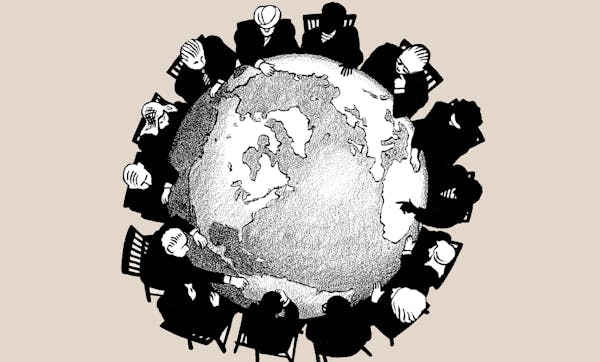The Minnesota International Center is celebrating its 60th anniversary this year. Founded in 1953, originally to provide services to foreign students at the University of Minnesota, MIC has evolved into a multifaceted, vibrant, nonpartisan organization with a mission "to promote international understanding and engagement; we educate, we inspire and we provide enriching interactive experiences."
As the population of the Twin Cities and Minnesota as a whole increasingly diversifies, the value of MIC rises. The city of Minneapolis has just elected the most multicultural City Council in its history, with representatives from the Somali, Hmong and Latino communities reflecting the changes in the city's population; Minnesota's businesses and civic organizations have relationships with countries in every corner of the world, and more than 40 corporations are active supporters of MIC's programs. There are more than 5,500 foreign students from more than 130 countries studying at the University of Minnesota alone.
MIC makes a significant contribution to the quest for cultural understanding and global awareness through its comprehensive range of programs, which encompass four general areas: international visitors, world affairs, community programs and global education.
Of the approximately 5,000 foreign visitors whom the U.S. State Department brings to the United States each year through the International Visitor Leadership Program, we are proud that MIC is selected to host 10 percent of the total. In 2012-13, MIC partnered with 378 local professional resources to arrange 496 appointments for 522 visitors from 134 countries and regions. Their programs may include a reception for MIC members and often include dinner in members' homes, a highlight for both the visitors and the hosts. In 2012-13, members hosted 390 visitors from 124 countries. Just this past week, MIC has hosted groups of visitors from Latin America and from the South Pacific Islands.
MIC's World Affairs Speakers Programs feature current or past foreign leaders, ambassadors, government officials or other experts on international affairs and global issues. Recent speakers have included the ambassadors to the United States from Canada and Panama. Every year MIC selects a focus country, both for programs and also to showcase at our annual June gala, and this year the focus country is Mexico. In conjunction with these activities, the Mexican ambassador to the U.S. will be visiting the Twin Cities in early April. Other focus countries over the past few years have included Morocco, Brazil, France, Malaysia, Turkey and Canada.
MIC's Community Programs are best in class and reach throughout Minnesota. We administer the largest network in the country of the Foreign Policy Association's "Great Decisions" discussion groups, with 60 groups around the state. Great Decisions topics for 2014 will include defense technology; Israel; Turkey; Islamic awakening; energy independence; food and climate; China's foreign policy, and U.S. Trade Policy. It is through this program that MIC has partnered with the Star Tribune, which publishes a monthly series of related columns and commentaries. MIC also hosts an annual Great Decisions conference in the fall; this year's topic was global food security.
Another signature community-based program is WorldQuest, an international current-affairs competition which fields teams from corporations, organizations and civic groups. Other community programs include our "Culture Through Cuisine" international restaurant and food program, and en Route, a networking group of young professionals interested in internationally focused careers.
Our Global Education program focuses on Minnesota's new K-12 curriculum standards. MIC is working with the St. Paul public schools and others in developing curricular materials to help teachers meet standards related to international understanding. We have also sent groups of teachers to Turkey each of the past two summers. In addition, our Academic WorldQuest Competition is a high school version of our popular Community WorldQuest; the winning team of students and their coach from our local competition travels to Washington, D.C., to compete nationally.
MIC is the Minnesota member of the World Affairs Councils of America (WACA), which last week held its annual conference in Washington, D.C. Throughout the conference, the importance of civic engagement was emphasized. This concept was underscored by U.S. Supreme Court Justice Stephen G. Breyer. Justice Breyer was speaking about the development of the rule of law in America, particularly as a model for the governments of emerging nations. He quoted the ancient Greek statesman Pericles, who famously said: "We do not say that a man who takes no interest in public affairs is a man who minds his own business. We say he has no business being here at all."
The Minnesota International Center can truly make a difference in helping all Minnesotans become not only citizens of our community, but also citizens of the world.
Leni Moore is chair of the board of directors for the Minnesota International Center.

